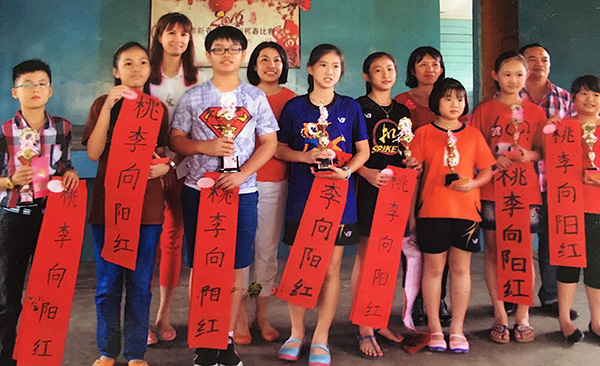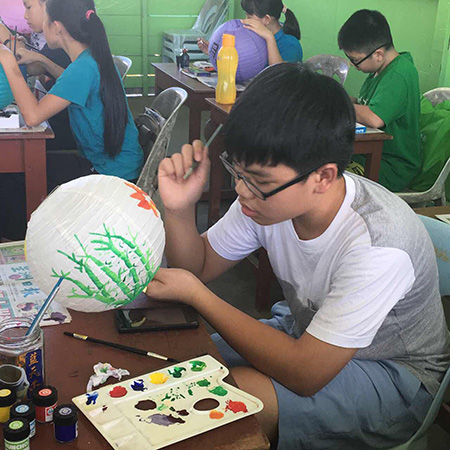
Gao Yi (fourth left) taking part in calligraphy writing with his schoolmates.
EARLY Oct 25 morning, Lee Kim, a primary school teacher, had a premonition.
She felt something bad was going to happen and the feeling was getting stronger by the minute.
When Lee Kim reached school, she learned from the discussions among the teaching staff that the teacher, assigned to drive her 12-year-old son, Leong Gao Yi, from Mukah to attend a camp in Sibu, had no long-distance driving experience. The teacher had never driven with a convoy before.
This made Lee Kim even more uneasy but she kept her composure and went about teaching her class although an inner voice kept telling her to stop the Sibu-bound four-car convoy, carrying four teachers and 14 students, including Gao Yi.
Her sense of foreboding became so overpowering that she had to stop teaching and rush to obtain permission from the person-in-charge to replace the teacher who was to drive Goa Yi and two other students to the camp.
Lee Kim said she was prepared to be the substitute driver since she has frequently driven between Mukah and Sibu and knows the road well.
Her request was rejected. She stopped pursuing the matter and returned to her class.
At about 11 o’clock that morning, when the car carrying Gao Yi and the two students reached the Sitapan area, it encountered a mishap and plunged down a slope.
The teacher who was driving and the two students were injured but Gao Yi died on the spot from head injury.
That afternoon Lee Kim’s 74-year-old father, Voon Sam Ted, received the tragic news from her over the phone.
Heavy price to pay
Lee Kim, who also has a 15-year-old daughter, has remained silent all this while but Voon, a retiree, felt he had to speak up.
He then wrote an article titled ‘A Heavy Price to Pay’, relating the events taking place before the Oct 25 incident, the death of Gao Yi and the community’s response to the tragedy.
The article, written in Chinese, was uploaded by Voon’s other daughter, Lee Khim, on social media and it caught attention of netizens.
Lee Khim later translated it into English.
A distraught Voon told thesundaypost recently he believed there was a special connection between mother and son — which was why on that fateful morning, Lee Kim felt something might go wrong and tried to request for a change of driver but her request was swept aside without even the slightest reconsideration.
“Not only that, Lee Kim was told off — that she was being too protective of her children and had difficulty letting go because she has only one boy and one girl. Why jump to the conclusion and make unkind remarks just like that? This is uncalled for. If my daughter’s request was heeded, perhaps Gao Yi would still alive,” Voon said.
The septuagenarian also questioned the policy of the Education Department regarding the provision of proper transport for students travelling long distances to attend extra-curricular activities, organised by the department.
“Why was proper transport not provided? Was it because of budget or negligence? Teachers are teachers. They are not skilled or experienced drivers. Is it right for teachers to shoulder the additional responsibility of driving students to participate in activities, organised by the Education Department?”
Voon explained he wanted this case made public not to cause others to suffer like his family but rather in the hope that Gao Yi’s death would not be in vain and would also offer two lessons.
First, there might be some kind of paranormal connection between parents and their children. This should not be dismissed outright.
Secondly, the Education Department should provide proper transport for students attending functions, organised by the government.
“The unfortunate incident of Oct 25 should not happen again. One young death is more than enough,” the grieving grandfather said.
Just too painful
No one talks about Gao Yi’s death but many know about it.
A teacher from Sibu, who only wants to be known as Anastasia, said every teacher in her primary school knew about the case but never discussed it.
“It’s just too painful. For us teachers who usually gather to discuss just about anything under the sun, this topic has never been brought up. We all knew but just didn’t talk about it,” the 53-year-old added.
However, following the incident, her school decided to cancel the trip to Bintulu for its Primary 6 pupils.
Anastasia said on reflection, “We feel for the mother who is also a teacher. But who should be blamed? The teacher who drove the car that day? Even if proper transport and an experienced driver were provided by the Education Department, accidents might still happen. An experienced driver is, after all, only human too.
“Do we blame the person-in-charge? I’m not sure. I wasn’t there and had no idea what caused the person-in-charge to make such a decision. Do we blame the Education Department? There are so many schools in Sarawak. Can the Department provide transport every time students need to attend some activities outside school?
“Honestly, I don’t know how to respond to the whole situation. I think other teachers also don’t know what to say. That’s why we never discussed it.”
A teacher for over 30 years, Anastasia has many times been assigned to bring students for extra-curricular activities outside school and each time, she admitted she was very worried.
“The burden is even heavier than when I bring my own children around. But we have to carry out what we have been assigned.”
To avoid unnecessary misunderstanding on such assignments, Anastasia’s school adheres to a couple of mutually accepted principles.
First, the school always picks students whose parents can chauffeur them unless it’s for a competition where the students taking part have been specifically identified.
Even in such a case, the parents have to be approached first. Only when the parents cannot make it will the teachers take over. When a big group of students are involved, the school will charter a school bus.
Secondly, before taking students outstation, the teachers have to make sure the parents sign a letter of indemnification.
“It has never been our choice to travel with students for extra-curricular activities. It is an extra mile we go for the sake of the students and the school. We all know the heavy responsibility involved. But most times, we have no choice,” Anastasia said.
She added that following the Oct 25 tragedy, the Education Department had come up with a new policy to insure students travelling to take part in activities outside school.
“Does insurance help? Is it the solution? I don’t have the answer,” she conceded.

Gao Yi painting on a lantern.
No-win situation
Sarawak United Association of Private Chinese Secondary School Management Board vice-chairman Datuk Richard Wee said he felt very sad after reading the article written by Voon.
“I was deeply saddened and felt so sorry for the family and for the loss of a young life. But I do believe it was an unfortunate accident and nothing good will come out of apportioning blame.”
Wee, who chaired the Board of Management of Chung Hua Middle School (CHMS) Nos. 1, 3 and 4 at one time, understands the struggles of teachers in coping with their workloads.
And as a father of four, he empathises with Gao Yi’s grieving family but believes the teachers from the school were just doing their jobs.
Citing the examples of CHMS Nos. 1, 3 and 4, he said the teachers in charge of the schools’ lion dance troupes had been driving the students to the venues where they were requested to perform.
“The teachers’ job is to teach. But many have to go the extra mile to chauffeur their students for various competitions and activities. So to put the blame on teachers when an unfortunate incident occurred would seem a bit untoward.
Regarding the ‘insensitive’ remarks made against Lee Kim for requesting to chauffeur her son to Sibu, Wee is certain that on hindsight, the person concerned must be feeling very bad and thus should not be condemned.
“She may have other considerations when turning down the mother’s (Lee Kim’s) request. The mother is also a teacher of the school. If she were allowed to go, lessons or class arrangements might be affected.”
Wee felt there was no right answer as it was a no-win situation.
“Perhaps, rather than providing an answer, let us all think about it and learn to be wiser,” he added.
Meanwhile, a parent in Kuching who only wants to be known as Cindy, believed the person-in-charge should more careful about making decisions on student safety.
“After reading the article, I felt something tugging at my heartstrings. It’s sad that uncalled for words had been uttered to a parent and a decision made that apparently overlooked safety as a priority,” she said.
Official response
Like Wee and Cindy, many who read the article felt the family’s pain.
Welfare, Women and Community Development Minister Datuk Fatimah Abdullah was in Mukah to express her condolences to the family.
“A lot of people are feeling the pain. This is especially true of the teacher who drove the car and the person-in-charge who made the decision not to let the mother drive.
“There are lots of ‘what ifs’ — and that things should have been done this way and that way. However regretful we are, we will not be able to bring Gao Yi back,” she said.
Fatimah said the Education Ministry previously allocated some budget for transporting students to co-curricular activities but when the allocation was not forthcoming, different schools sought assistance from different sources.
“Some go to parent-teacher associations, some to state assemblymen while others manage by other means. In Goa Yi’s case, they got the teachers to help drive the students to the school camp while another school chartered a van,” the Minister said.
“Now, looking back, we can try to blame the Education Ministry for not giving the allocation, or the teacher who drove the car. Or do we blame the person-in-charge? But does that help? I don’t know and I also don’t know what to say to make the grieving family feel better,” added Fatimah, who is Dalat assemblywoman.
Conclusion
Last Wednesday, Lee Khim sent some photos of Gao Yi. In the family photos, Gao Yi appeared to be a contented and sweet child, very much loved by his family.
In his activity photos, he was always prominently featured — a child of quiet disposition but one showing great confidence.
If Gao Yi were here, what would he say? Would he be angry his life had been cut short because of a combination of circumstances?
Would he blame the teacher who was driving, the person-in-charge or the Education Ministry? Or would he just say, “I loved and was deeply loved and treasured by many. I lived a good life and hope all of you would have a good life too.”
In his article, grandpa Voon also wrote that people from all walks of life, including Gao Yi’s classmates, students, teachers, Education Ministry officials and the Mukah community, had come to offer their condolences.
For someone so well loved by many and who had loved them back, Gao Yi would likely have preferred to forgive and wish everyone well.
Perhaps Gao Yi’s only regret would be that he could no longer be with his family, but he would likely want his family, especially his loving grandpa, to be happy and continue living a good life without him.
While the family moves on, let us spare some thought to the consequences of the Oct 25 incident and ponder if we could learn something from it. More importantly, let us make sure Gao Yi did not die in vain.
